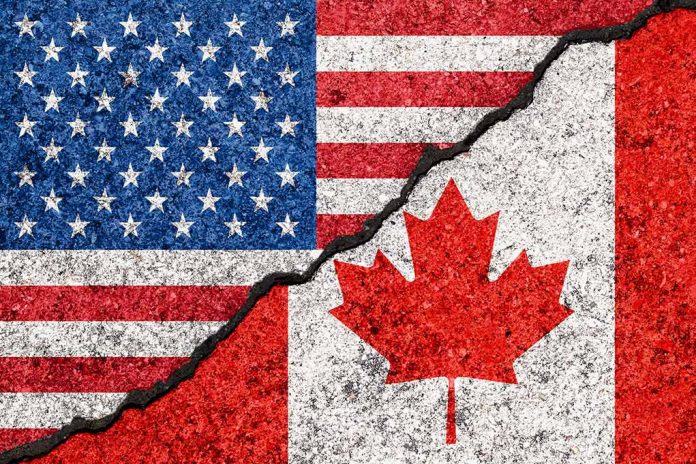
President Trump’s tariffs on Canadian imports have ignited a trade war as Prime Minister Justin Trudeau announces retaliatory measures, threatening economic stability on both sides of the border.
Key Takeaways
- President Trump imposed 25% tariffs on Canadian and Mexican imports, and 10% on Chinese goods.
- Canada retaliated with 25% tariffs on C$155 billion worth of U.S. goods.
- The trade conflict risks disrupting over $2.5 billion in daily cross-border trade.
- Both countries face potential job losses and increased consumer costs.
- Trudeau warns of further non-tariff actions and urges Canadians to support domestic products.
Trump’s Tariffs Spark Trade Conflict
In a move that has sent shockwaves through North American trade relations, President Donald Trump signed executive orders imposing significant tariffs on imports from Canada, Mexico, and China. The decision places a 25% tariff on imports from Mexico and Canada, with a slightly lower 10% tariff on Canadian energy imports. This action, aimed at addressing the U.S. trade deficit and curbing fentanyl imports, has drawn criticism from industries reliant on international trade and sparked immediate retaliation from America’s northern neighbor.
The impact of these tariffs could be far-reaching for U.S. consumers, potentially leading to increased prices on a wide range of products, including automobiles, electronics, and fresh produce. This move comes at a time when the U.S. economy is already grappling with challenges such as a housing shortage and the lingering effects of the COVID-19 pandemic on sales.
WATCH: Canada retaliated against Donald Trump’s new tariffs with 25% levies on many US imports https://t.co/g6ri0v4ycW pic.twitter.com/SGzSPll6Q7
— Reuters Asia (@ReutersAsia) February 2, 2025
Canada’s Swift Retaliation
In response to Trump’s tariffs, Canadian Prime Minister Justin Trudeau announced a set of retaliatory measures. Canada will impose 25% levies on C$155 billion ($107 billion) worth of U.S. goods, with C$30 billion taking effect immediately and the remainder within 21 days. These counter-tariffs target a wide range of American products, including alcoholic beverages, clothing, sports equipment, and household appliances. “Tariffs against Canada will put your jobs at risk, potentially shutting down American auto assembly plants and other manufacturing facilities,” Trudeau warned. “They will raise costs for you, including food at the grocery store and gas at the pump,” Trudeau went on to say.
The Canadian Prime Minister also emphasized that while Canada did not seek this conflict, they will not back down. He also hinted at the possibility of additional non-tariff measures related to critical minerals and energy procurement, further escalating the trade tensions between the two nations.
Economic Implications
The trade conflict between the United States and Canada threatens to disrupt a deeply integrated economic relationship. Over $2.5 billion in trade crosses the U.S.-Canada border daily, with significant contributions from energy and manufacturing sectors. In 2023, Canada exported C$550 billion worth of goods and services to the U.S., accounting for a substantial portion of its GDP and jobs.
The tariffs could lead to job losses and increased costs for consumers on both sides of the border. Industries reliant on cross-border trade, such as the auto sector, may face significant challenges. The United Steelworkers union and the U.S. Chamber of Commerce have voiced their concerns about the potential negative impacts on American businesses and workers.
Political Landscape
This trade dispute unfolds against a backdrop of political changes in both countries. In Canada, Trudeau is planning to resign after a new Liberal Party leader is chosen, adding an element of uncertainty to the country’s leadership during this critical time.
As both nations navigate this complex trade conflict, the economic and political ramifications continue to unfold. The coming weeks will be crucial in determining whether diplomacy can prevail or if this trade war will escalate further, potentially reshaping the longstanding economic partnership between the United States and Canada.
Sources:
Trudeau answers after Trump imposes tariffs on goods from Canada, China and Mexico
Canada announces retaliatory tariffs on long-time ally US



